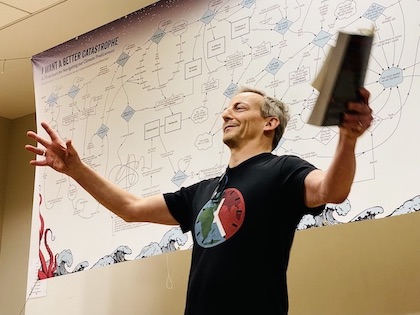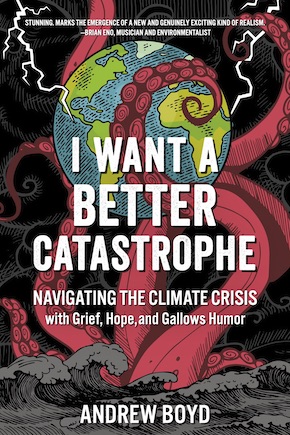We need to do the impossible, because what’s merely possible is gonna get us all killed
by Andrew BoydWe can debate whether the problem is Us or Them. We can endlessly parse false and real solutions, and fight over what – given prevailing political realities – we’re willing to consider “good enough.” We can argue whether to focus on mitigation, adaptation, or suffering. We can quarrel over whether our salvation lies in individual actions like recycling, or in collective action that brings about systemic change. And these are all important debates. But you might wonder: why debate any of it if, ultimately, our task is impossible? But here’s the thing: given what’s at stake, we can’t afford to fail. It can’t be impossible. And given how quickly time is running out, it needs to not be impossible as soon as possible. Even if it’s impossible.
“Don’t let the perfect be the enemy of the good,” the political pragmatists tell you. And sometimes they’re correct. If, say, we’re talking about a multi-decades effort to reform an unjust and inefficient healthcare system, you could see how getting something imperfect like Obamacare through Congress – because it’s the best deal you can get at the moment – and making it better as you go, might be the right strategy.
But what if “the good” will lead to runaway climate change, the collapse of civilization, and the destruction of everything you love? Then maybe “the good” is simply not good enough. In fact, given the relentless logic of climate change, “the perfect vs. the good” doesn’t even begin to capture our dilemma; it’s more like “the bare-minimum-needed-to-not-go-extinct vs. going extinct.”
So, if you’re debating possible climate strategies with someone, and they say to you, don’t let the perfect be the enemy of the good, what they’re really saying is don’t let what we absolutely must do right now to save ourselves be the enemy of the best deal we can get right now which will kill us all.
It would seem a no brainer, then, that we should get on with what is absolutely necessary and be right quick about it. I mean, if that’s what’s absolutely necessary, what’s the point of doing anything else? And that’s exactly when the other half of our dilemma kicks in. Because what’s absolutely necessary is, well, impossible.
We know what is absolutely necessary to stay under 2°C (immediate moratorium on all new fossil-fuel extraction, controlled degrowth of the world’s richest economies, WWII-level emergency mobilization to make a fast and just transition to a post-carbon economy, etc.) and it’s politically impossible.
Meanwhile, the most ambitious edge of what seems actually achievable (“net-zero by 2050,” etc.), is utterly insufficient. In fact, it could very possibly get us all killed. So, what’s our move? Do we focus on what we know we need to do, even though there’s no chance of getting it done? Or do we focus on what we actually can get done, even though it won’t ultimately save us? The 21st century can be a real bitch sometimes.
It always seems impossible until it’s done.” – Nelson Mandela
Your choice will likely depend on who you are.
If, like me, you’re a tragic optimist, you will set your sights on the goal that is necessary yet impossible, and give it your all, hoping that the impossible somehow becomes possible before it’s too late. (After all, there’s nothing more inspiring than a smart, dedicated, reality-based person acting as if the impossible were possible to actually make it so.)
On the other hand, if, and also like me, you’re a can-do pessimist, you will set your sights on the most ambitious goal you think you can pull off even if you know it’s insufficient to the task, trusting that in the unlikely event (remember, you’re a pessimist) of achieving it, you might just create the conditions for an even more ambitious goal that is up to the task.
But what if – and also also like me – you’re a compassionate nihilist? You recognize the cosmic futility of both these approaches, but you also recognize their profound and heroic humanity – what then? Well, you could offer back rubs to any of the stressed-out people engaged in these heroic efforts. Back rubs and donations and volunteer time and whatever talent you have to offer (including writing a book about the grand dilemmas we face). Contrary to conventional wisdom, you don’t actually have to believe in anything to start giving a shit.
from I Want a Better Catastrophe (New Society Publishers, £21.99)
—

Andrew Boyd is an author, humorist and climate activist. He is currently Chief Existential Officer of the Climate Clock, a global campaign he co-founded that melds art, science, technology and grassroots organizing to get the world to #ActInTime. His previous books include Beautiful Trouble (OR Books, 2012); Daily Afflictions (WW Norton, 2002), and Life’s Little Deconstruction Book (WW Norton, 1998). I Want a Better Catastrophe is published by New Society Publishers in paperback and eBook.
newsociety.com
bettercatastrophe.com
climateclock.world
Buy from Bookshop.org.uk
@andrewboyd
@theclimateclock
@NewSocietyPub
Andrew Boyd’s ‘stand-up tragedy’ I Want a Better Catastrophe tour continues in the UK and Europe (and online) throughout June, beginning in London and Bristol from Monday 12 to Friday 16.
More info and book


